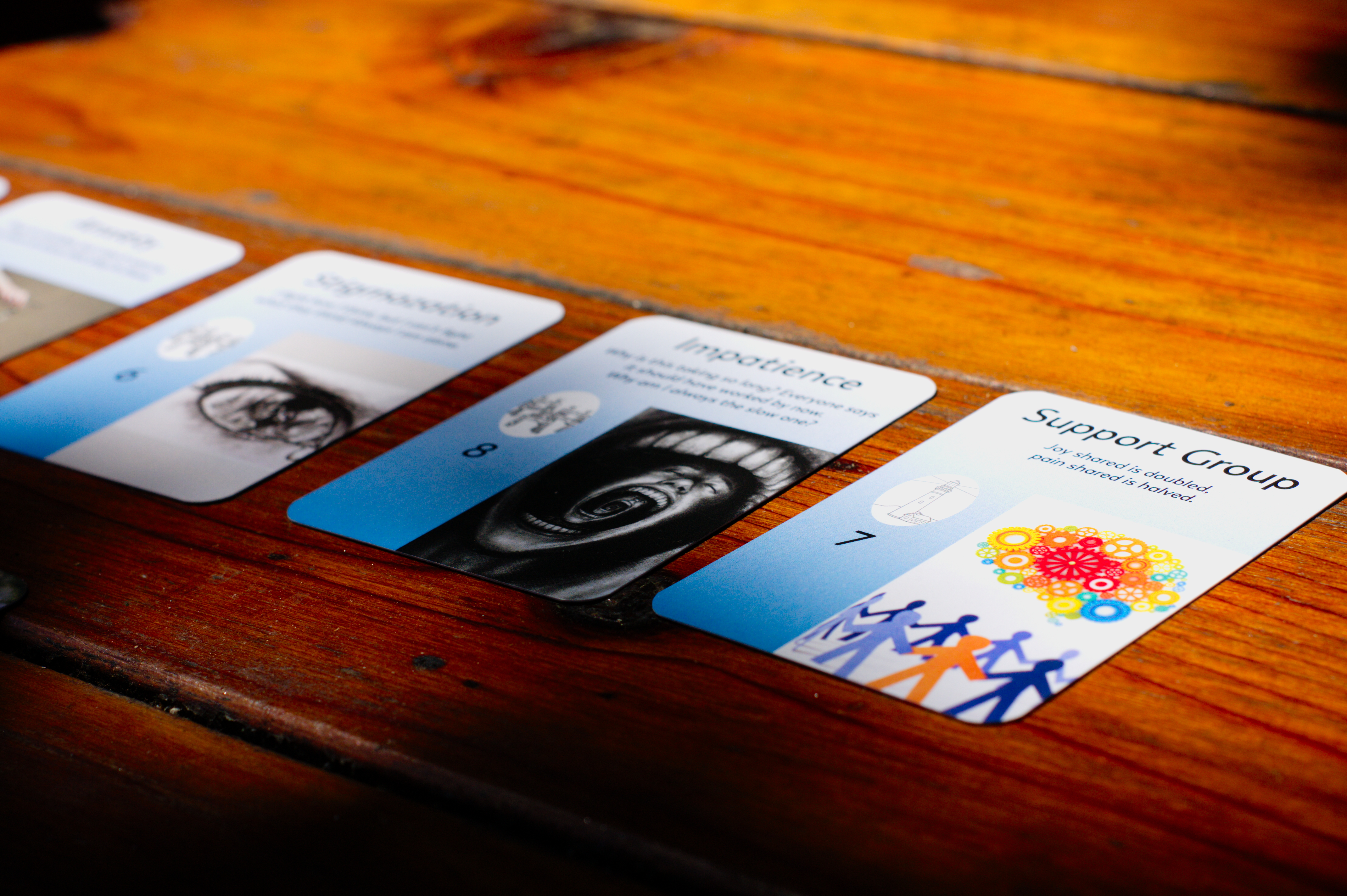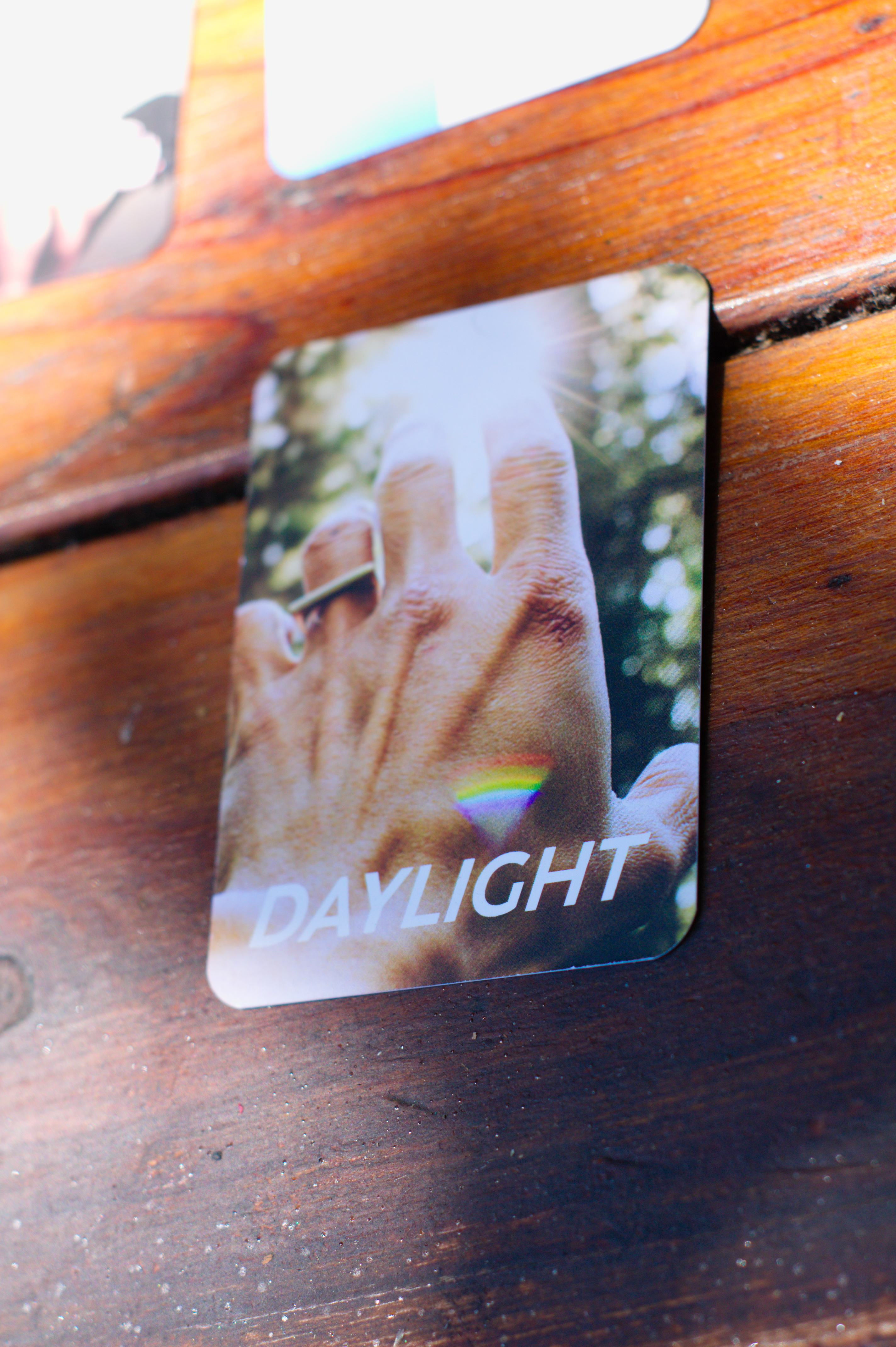In the 1931 Frankenstein film, there is a scene where Frankenstein’s monster (played by the late Boris Karloff) is locked in an underground dungeon, darkness all around him. As the sun comes up, he reaches for the beams of sunlight, holds his hands up to it, trying to grasp it.
“That’s what it feels like,” says game designer Alex Jimenez, “You’re trying to grasp that sunlight. He’s surrounded in darkness, and he’s trying to pull that light into himself—to warm himself up. It just brings tears to me when I see it. You look at that, and it’s this ridiculous monster movie, but it expresses exactly to me what it’s like to suffer from depression.”
Videos by VICE
It’s a scene that Jimenez credits for his inspiration for Daylight, a cooperative card game about dealing with mental health. Jimenez reached out to his long-time friend, Tim Burns, to collaborate in creating a game that could be used both as a therapeutic tool and a party game.
Timothy Burns is a youth counselor who uses games (both the video and tabletop variants) as a way to reach youth in crisis. “My take on it is that I hate the clinical makeup of social work. I think that you’re much better at connecting with youth in nontraditional ways. Using games really allowed for this—playing Rocket League with youth opens up a conversation.”

“Video games are a big industry. And to youth, they’re a big world. I’ve had youth who primarily communicate in memes. Understanding video games to work with them is just the next evolution of working with a client. You can’t come into it outdated, trying to play Monopoly or something. It’s all about trying to find ways to access youth on a level that they’re comfortable with.”
For Burns, the game is a way to bridge communication to many youth. “In a therapeutic setting, my goal with this is to use it to form conversations, so if I have youth who are working with aggression or anxiety or any multitude of behaviors, it can prompt conversations. What does anxiety mean to you? It’s a way to bring that into a play therapy group session.”
Play therapy is a therapeutic methodology focused on using play (in this case, card or video games) as the foundation of reaching younger clients who might be reluctant to engage in more traditional forms of talk therapy. Its application using video games specifically is newer, but Burns sees it as an excellent method of “meeting the client where they’re at,” engaging at the level that the patient is comfortable with and using that as a starting point for conversation.
Games allowed for Burns to connect with troubled youths who previously didn’t have many reliable people to talk to. His current work involves a combination of working in-person with youth, but also conducting sessions and check-ins via more digital methods—hopping into a game of Sea Of Thieves with a patient over Discord and chatting would often yield easier results than talking face-to-face.
“I had one youth I was working with who was homeless, but they were really into Magic: The Gathering, and it was the only thing they wanted to talk about. I’m… not a fan of Magic: The Gathering! I really don’t enjoy playing it, but I would sit there for three hours a day with this youth getting my ass kicked over and over again, but it would start opening stuff up about how they started to play Magic. It opened the door, and suddenly the floodgates opened and I was talking about how they went from living with their parents to living in a foster care situation, and their experiences. It gave me that initial buy-in. “
Burns sees Daylight, and other games like it being developed by Jimenez’ studio, Heavily Medicated Games, as a way to start those conversations. “Youth love to talk. But getting them to talk is one of the hardest things in the entire world.”
Daylight is a cooperative card game for three or more players. While the rules are still in a early state of being iterated on, Jimenez based the game system on an earlier game he prototyped, and is working to adapt it for Daylight’s ruleset. Cards are split into four types, currently called “Emotions”, “Blocks” (representing harmful behaviors or situations), “Darks” (symptoms of mental health issues), and “Guides” (positive behaviors or situations). The art for each card, Jimenez explains, is ideally going to be drawn by someone with experience with that specific emotion or situation (he drew and wrote the “Fear” card).

The game revolves around a twofold victory mechanic system: Players will each receive an individual goal (kept secret) as well as a single group victory goal, laid face up on the table. Players must contribute to the group victory before declaring an individual victory—Jimenez views it as a way to foster cooperation and communication between players. “Yeah, you won, but you also contributed at the same time.”
One of the things Burns notes about cooperative multiplayer games (both digital or physical) is that allowing some tweaks to the ruleset can build on cooperative instincts that youth may feel sheepish about acknowledging in other settings. The ability to add mods to digital games is especially useful, as making more zombies spawn in a Minecraft server can force a play group to work together, or lowering resource spawn rates in Terraria encourages communal building.
Both Burns and Jimenez credit games as part of their way of dealing with personal mental health issues. For Burns, it was Stardew Valley, which he cites as one of the things that helped him through a particularly bad depressive period of his life. For Jimenez, Daylight is a possibility to give back to players, but also to White Bird Medical, a local free health clinic in Eugene, Oregon that he credits with keeping him from serious self-harm. He plans to donate 5% of profits from Daylight to White Bird.
Jimenez isn’t a stranger to the game design world. He’s worked in and out of digital and tabletop games for the greater part of the last three decades. He was one of the original creators of many Capcom arcade hits, including Darkstalkers, Marvel Super Heroes, the Dungeons & Dragons arcade games ( Tower of Doom and Shadows Over Mystara), among many others. After leaving Capcom in 1997, he’s worked as a consultant, writer, and creative lead at numerous other studios, as well as working as an educator at multiple colleges of game design. In 2014, he started Heavily Medicated Games, his own studio specifically angled at tabletop games for younger audiences.
“I thought that the most frustrating thing about it is that it’s… so hard to explain to people what’s going on inside.”
“You know, we called our company Heavily Medicated Games, why don’t we do a game that spotlights mental health?” Jimenez explains. “There are so many people that struggle with mental health (myself included) that have fought it for years, and I thought that the most frustrating thing about it is that it’s… so hard to explain to people what’s going on inside.”
The power of games to be a tool in helping mental wellness and helping communities is on the mind of both Jimenez and Burns, but they are confident that no matter what happens with Daylight, they’ll be satisfied.
“I’ve had a wonderful career,” Jimenez says. “I’ve had a magnificent life making games. I’ve dedicated my life to helping people have fun. My wife pointed that out: You spent twenty-seven years making people laugh, and making people happy. That’s not bad. This game will be a capstone on that. It’s my chance to give back.”
More
From VICE
-

Screenshot: Game Science -

Screenshot: Survios -

Screenshot: The Game Awards -

Screenshot: Microsoft Game Studios
